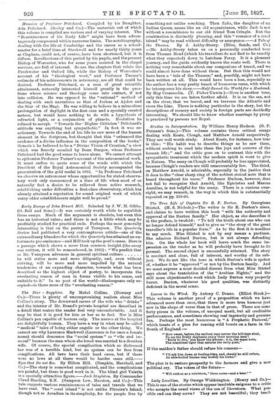The Star - Sapphire. By Mabel Collins. (Downey and Co.)—There
is plenty of uncompromising realism about Miss Collins's story. The downward career of the wife who " drinks " and the interior of Mr. Brand's private hospital are described in a detail that makes the reader feel very uncomfortable. .And it may be that it is good for him or her so to feel. Nor is Miss Collins's pen capable of horrors only. The nurses at the hospital are delightfully human,. They have a way in what may be called " medical " tales of being either angelic or the other thing. We cannot see why Laurence Idarkwell (Laurence is for once a female name) should denounce the "social system" as "vile and im- moral" because the man whom she loved was married to a drunken wife. Of course, the special complication which so distressed her was of a terrible kind, but no system can be free from complications. All laws have their hard cases, but if there were no laws at all there would be harder cases still.— Eyes that Do not See. By Hilton Hill. (Simpkin, Marshall, and Co.)—The story is somewhat complicated, and the complications are painful, but there is good work in it. The blind girl Valetta is a specially attractive fig-ure.--Jack Stapleton. By Commander Claud Harding, RN. (Sampson Low, Marston, and Co.)—This tale suggests various reminiscences of tales and travels that we have read. The " coral island" is not unlike Pitcairn's Island, though not so Arcadian in its simplicity, for the people live by
something not unlike wrecking. Then Zalia, the daughter of an Indian Queen, seems like an old acquaintance, while Jack is not without a resemblance to our old friend Tom Crin.gle. But the combination is distinctly pleasing, and this "romance of a coral island" may be read without difficulty or annoyance.—A Tale of the Thames. By J. Ashby-Sterry. (Bliss, Sands, and Co.) —Mr. Ashby-Sterry takes us on a personally conducted tour from Thames Head (which his travellers do not find to be exactly what they expected) down to Latcham Ferry. It is a pleasant journey, and the guide evidently knows the route well. There is nothing very remarkable about our companions of travel, and we could almost have done without them. But then this would not have been a "tale of the Thames," and, possibly, might not have been written at all. This would have been a loss, especially as the author has a very pretty knack of humorous verse, with which he intersperses his story.—Half-Round the World/or a Husband. By May Crommelin. (T. Fisher Unwin.)—Here is another tour, only this time we are taken further afield. It is on the sea, not on the river, that we travel, and we traverse the Atlantic and cross the Line. There is nothing particular in the story, but the descriptions of scenery and society in foreign parts are decidedly interesting. We should like to know whether marriage by proxy is practised by persons not Royal.


















































 Previous page
Previous page